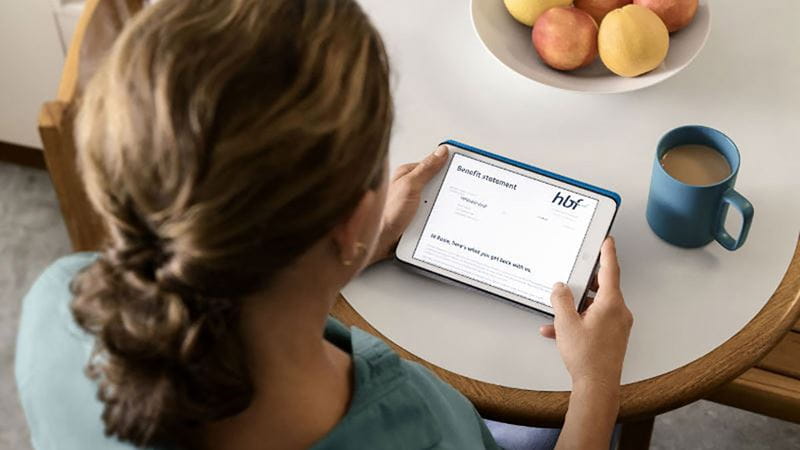Blog article
HBF Health Quiz

Equally important is understanding how to manage chronic conditions - whether you’re recovering from a cardiac event, dealing with diabetes or working to prevent health issues.
Test your health knowledge with our quiz.
Good luck!
1) How much sleep is recommended for adults?
a) 8-10 hours
b) 10-12 hours
c) 9-11 hours
d) 7-9 hours
2) What is the recommended daily water intake for women and men?
a) 1.4 litres for women / 2 litres for men
b) 2 litres for women / 1.4 litres for men
c) 2.6 litres for women / 2 litres for men
d) 2 litres for women / 2.6 litres for men
3) What is the recommended amount of physical activity per week for adults?
a) 3 to 5.5 hours of moderate intensity physical activity / 1.5 to 3 hours of vigorous intensity physical activity
b) 1.5 to 4 hours of moderate intensity physical activity / 2 to 3.5 hours of vigorous intensity physical activity
c) 2 to 4.5 hours of moderate intensity physical activity / 1 to 2 hours of vigorous intensity physical activity
d) 2.5 to 5 hours of moderate intensity physical activity / 1.25 to 2.5 hours of vigorous intensity physical activity
4) What is the recommended daily intake of fruits and vegetables?
a) 3 serves of vegetables and 4 serves of fruit
b) 2 serves of vegetables and 5 serves of fruit
c) 4 serves of vegetables and 3 serves of fruit
d) 5 serves of vegetables and 2 serves of fruit
5) What are some manageable risk factors to help prevent type 2 diabetes?
a) Eating a high fat, high sugar diet
b) Taking it easy and minimising exercise to twice a week
c) Losing weight if necessary
d) Increasing physical activity and eating healthily
6) What are the potential complications of poorly managed diabetes?
a) Increased risk of heart attack, stroke, and high blood pressure
b) Eye damage
c) Kidney disease
d) All of the above
7) What are some of the warning signs of a heart attack?
a) Having an anxiety attack
b) Chest pain following exercise or a large meal
c) Sweating or a cold sweat
d) Chest tightness, discomfort or pain and numbness in arm
8) What lifestyle changes can help manage high blood pressure?
a) Exercising less
b) Eating salty foods
c) Working with a health professional
d) Eating a well-balanced diet, taking your medication regularly and maintaining a healthy weight
9) How often should you see your GP?
a) Only when you feel unwell
b) Once every 2 years
c) Once a year
d) It varies depending on your age and health status
10) How can HBF’s personalised telephone health coaching program, COACH, support you to achieve your health goals?
a) Could be fully covered under your HBF Hospital Cover
b) Works to complement existing care received by your GP
c) Beneficial if you’re recovering from a cardiac event or living with a chronic health condition such as diabetes, or at risk of developing type 2 diabetes or heart disease
d) Provides trusted support, education, ongoing encouragement and tailored health advice
e) All of the above
Answers
1) How much sleep is recommended for adults?
d) 7-9 hours
Sleeping too much or too little can raise your chances of getting heart disease, obesity, type 2 diabetes and even increase the risk of death.1 Poor sleep is also associated with mental health conditions.
2) What is the recommended daily water intake for women and men?
d) 2 litres for women / 2.6 litres for men
Since over half of our body is made up of water, staying hydrated is important for our health. We get about a fifth of our water from food, but most of it comes from drinking.2
Water helps us to move easily, break down food and absorb nutrients, remove waste from the body and regulate body temperature.
3) What is the recommended amount of physical activity per week for adults?
d) 2.5 to 5 hours of moderate intensity physical activity / 1.25 to 2.5 hours of vigorous intensity physical activity
Staying active is important for both mental and physical health. It reduces the risk of developing diseases such as type 2 diabetes, certain cancers and cardiovascular disease. It also helps with weight management.3
Experts recommend a minimum of 30 minutes of moderate-intensity physical activity most days (preferably all) to maintain optimum health.4
Moderate intensity physical activity can be a brisk walk, playing golf, mowing the lawn or swimming. Vigorous intensity physical activity can be jogging, aerobics, fast cycling, soccer or netball.4
4) What is the recommended daily intake of fruits and vegetables?
d) 5 serves of vegetables and 2 serves of fruit
Eating a variety of fruit and vegetables is important to get the vitamins, fibre and minerals you need. It also helps protect you against diseases like diabetes, cancer and heart disease.5
The different colours in fruits and vegetables provide unique nutrients that help your body work at its best. This is why experts say, ‘eat a rainbow’.
5) What are some manageable risk factors to help prevent type 2 diabetes?
d) increasing physical activity and eating healthily
Type 2 diabetes happens when your body doesn’t use insulin properly, leading to high blood sugar levels.
While type 2 diabetes is strongly related to genetics and environmental risk factors, there is also a connection to lifestyle factors. To help prevent diabetes you should do regular physical exercise, maintain a healthy weight and eat a balanced diet.6
6) What are the potential complications of poorly managed diabetes?
d) All of the above
Diabetes is caused by too much glucose (a type of sugar) in the blood.
Having ongoing high blood sugar levels can damage different organs in the body. This can lead to problems with both large and small blood vessels, increasing the risk of heart attacks, strokes, and issues with the kidneys, feet, nerves and eyes.7
7) What are some of the warning signs of a heart attack?
d) Chest tightness, discomfort or pain and numbness in arms
There are multiple warning signs of a heart attack, ranging from breathlessness, nausea, sweating, dizziness and pain in your jaw or down your left arm.8
Any type of chest pain or discomfort could be a sign of a heart attack, so it’s always important to see a doctor as soon as possible.
8) What lifestyle changes can help manage high blood pressure?
d) Eating a well-balanced diet, taking your medication regularly and maintaining a healthy weight
High blood pressure has been linked to an increased risk of heart disease, especially heart attacks or strokes.
A doctor can identify if you have high blood pressure and advise you on ways to manage it. Lifestyle changes to reduce blood pressure include limiting alcohol, exercising regularly, quitting smoking and managing stress.9
9) How often should you see your GP?
d) It varies depending on your age and your health
Regular GP visits are important as they allow your doctor to assess your overall health, run any necessary tests and help to identify the early signs of any issues.
How often you visit a GP largely depends on your age and any health concerns or ongoing medical conditions you may have. As you get older, you will need more frequent checks for things like blood pressure, cholesterol levels, heart health and cancer screenings.10
10) How can HBF’s personalised telephone health coaching program, COACH, support you to achieve your health goals?
d) All of the above*
Nice work on the quiz! Here’s how you did:
Mostly A’s & B’s: You’re on the right track, but a little more health knowledge wouldn’t hurt. Time to brush up and level up your wellness game!
Mostly C’s: You’ve got a solid grasp on health. Keep it up, and you’ll continue making great choices for yourself.
Mostly D’s: Awesome job! You really know your stuff. Go ahead and treat yourself to something healthy-you’ve earned it!
Remember, every step toward better health counts!
Contact us today to find out how HBF’s Coaching program, COACH*, could help you on the path to a healthier future.
*HBF Health support programs are fully-covered for members who hold an eligible level of HBF hospital cover and meet the program eligibility criteria. Member may only participate in each HBF health support program once per
Sources:
1AIHW – Sleep problems as a risk factor for chronic conditions
2Health Direct – Water and your health
3Better Health Channel – Physical activity – it’s important
4Australian Government Dept of Health and Aged Care – For adults aged 18-64
5Heart Foundation – Fruit, vegetables and heart health
6Better Health – Diabetes type 2
7Better Health – Diabetes long term effects
8Health Direct - Chest pain
9Heart Foundation – Blood pressure and your heart
10Better Health – Regular health checks
This article contains general information only and does not take into account the health, personal situation or needs of any person. In conjunction with your GP or treating health care professional, please consider whether the information is suitable for you and your personal circumstances.


